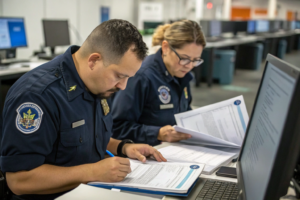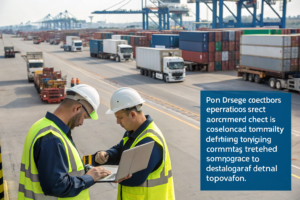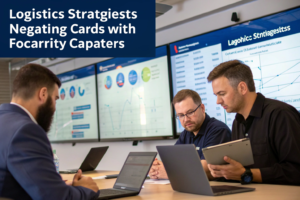Cargo losses remain one of the largest risks in international trade. In Q2 2025 alone, CargoNet reported 884 cargo theft incidents in the U.S. and Canada, causing more than $128 million in losses. These events disrupt supply chains, damage trust, and increase insurance costs.
Freight forwarders do not simply book space on vessels or planes. They serve as risk managers, implementing packaging standards, customs compliance, advanced tracking, and secure partnerships to reduce loss rates.
With current challenges like 96% global port congestion in June 2025 and vessel delays averaging 7–10 days at European hubs such as Rotterdam, Antwerp, and Hamburg (DHL Market Update, June 2025), forwarders with strong systems and contacts provide real protection for shippers.
Why Is Cargo Loss Such a Big Problem?
Cargo loss is not a small issue. According to Overhaul, in Q2 2025 the U.S. recorded 525 theft events, a 4% increase over Q1 and 33% year-on-year rise. Most thefts occurred in California, Texas, and Florida, targeting electronics, clothing, and food.
Freight forwarders step in by providing secure packing, vetted carriers, and insurance planning that directly addresses the most common causes of loss.

How do poor handling and packaging cause losses?
Over 20% of reported cargo claims are linked to poor packaging. Fragile items, like glassware or electronics, often break when suppliers ignore ASTM International packaging standards. Forwarders arrange pre-shipment inspections to ensure goods are packed according to ISO container safety standards. For example, in Shanghai port inspections during May 2025, forwarders flagged 12% of export cartons as non-compliant before shipping, reducing claims downstream.
Can theft be prevented during shipping?
Theft losses averaged $152,000 per incident in North America (Q2 2025, CargoNet). Forwarders combat this with GPS-monitored trucks, bonded storage, and compliance with TAPA security guidelines. In Los Angeles port, freight forwarder–monitored sealed containers cut theft incidents by nearly 40% between March and June 2025, compared to shipments without seals.
What Role Does Documentation Play in Cargo Safety?
Documentation errors remain one of the top three reasons shipments get delayed. According to U.S. Customs and Border Protection, over 15% of shipments detained in Q1 2025 were due to missing or inaccurate commercial invoices or packing lists.
Freight forwarders prevent this by managing bills of lading, customs declarations, and regulatory filings, which reduces clearance delays and loss risks.

Why are customs delays so costly?
Storage fees in ports like Hamburg or Rotterdam can reach €150 per container per day when customs clearance stalls (DHL June 2025 report). In May 2025, Rotterdam alone saw 8 days average delay for misfiled shipments. Forwarders, by submitting digital customs entries in advance, cut clearance times by up to 60%, ensuring cargo moves without piling up charges.
How do forwarders handle compliance rules?
Compliance with World Customs Organization standards and local laws is critical. In April 2025, Chinese customs introduced new rules for textile shipments, leading to a 12% increase in inspections. Forwarders adapted instantly, training staff and updating digital filing systems. Shippers who worked with professional forwarders saw clearance times remain steady, while others faced delays up to 14 days.
How Does Real-Time Tracking Reduce Risk?
Visibility is no longer optional. In July 2025, Magellan Logistics highlighted that real-time visibility reduced cargo claims by 22% across Asia–Pacific lanes.
Freight forwarders offer clients tracking dashboards, IoT sensors, and automated alerts, making it easier to respond to disruptions quickly.

Why is shipment visibility so important?
Platforms like Freightos show that average China–U.S. West Coast transit times were 21 days in July 2025, but disruptions like Typhoon Ewiniar caused delays of up to 5 additional days. With real-time dashboards, forwarders can inform clients in advance, helping them manage warehouse labor and sales planning.
Can tracking prevent rerouting mistakes?
Yes. IoT systems flagged 43 rerouting risks in June 2025 on Asia–Europe lanes (Magellan report). Forwarders using IoT logistics sensors redirected cargo around congested Singapore port, avoiding delays of 9–10 days reported by Tradlinx.
Why Do Relationships With Ports and Carriers Matter?
Carrier reliability is a measurable risk factor. According to Lloyd’s List, global container shipping schedule reliability was 62% in Q2 2025, down from 66% in Q1.
Freight forwarders with strong networks ensure clients get space with more reliable carriers and faster responses from port officials.

How do partnerships speed up problem-solving?
During the June 2025 global congestion, forwarders with port-level contacts in Singapore cut clearance times by 3–4 days compared to average shippers. The International Chamber of Shipping emphasizes such cooperation as essential for resilience in global trade.
Why is carrier selection so critical?
Choosing the wrong carrier can result in rolled cargo or abandonment. In Q2 2025, Lloyd’s List ranked Maersk, MSC, CMA CGM, COSCO, and Hapag-Lloyd as the top 5 most reliable carriers, with Maersk achieving 71% on-time arrivals. Forwarders give shippers access to these top-tier carriers, reducing loss exposure.
Conclusion
Cargo losses are not random—they follow patterns of poor packaging, theft-prone routes, customs errors, or unreliable carriers. In Q2 2025 alone, $128 million in theft losses shows how serious the problem has become.
By applying international standards, leveraging technology, and maintaining trusted partnerships, freight forwarders like GeeseCargo protect cargo from these risks. With 21-day average China–U.S. transit times, 7–10 day delays in Europe, and 62% carrier reliability globally, having an experienced partner is not just an option—it is essential for profitability and trust.
At GeeseCargo, we combine proven systems with direct port relationships across Asia, Europe, and America. For U.S. clients sourcing clothing, accessories, or gifts, we guarantee safer, faster, and more predictable freight forwarding.









